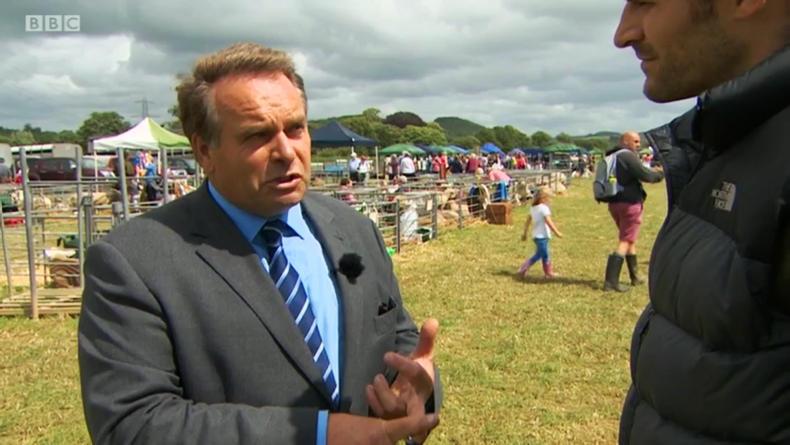Agriculture has been a fully devolved area of policy for the past 20 years, with the result that Scots have had relatively little reason to keep abreast of goings-on in EFRA, Westminster’s Environment, Food and Rural Affairs committee. However, with the possible resettlement of some, or all, agricultural decision-making to the UK Government after the UK leaves the EU, the EFRA committee is about to assume a vital role for Scottish agriculture.
EFRA’s chairman is Somerset farmer and former MEP, Neil Parish. He farms at Burnham on Sea, on the mouth of the river Parrett, six feet above sea level, growing wheat and rearing country mules.
The exigencies of political life mean that he’s handed on much of the day-to-day work to a young neighbour, but he did have time to bring in the wheat harvest during recess.
“It’s not been bad this particular year,” Neil reports. “We had some in at 19%, but mostly it’s been 16/17%. We had some bad sea floods in 1981 and had to put gypsum on the soil. The fields looked like a river bed.”
Neil was re-elected to the chair of the EFRA committee after the snap election in May, and shortly before Parliament broke for recess. He and the newly elected members of his committee will begin their work programme from 9 October, when MPs return to Westminster after party conferences.
Top of the committee’s agenda, unsurprisingly, is Brexit.
“First of all, we’re going to do an inquiry into trade, Brexit and various scenarios with the EU. We’ll be looking at tariffs and WTO trade rules, and getting experts in to look exclusively at trade with the EU. Other trade teals, for example with America, are several years down the road, so we need to work out how we keep lambs, cereals and dairy products exported. We will get on with that straight away.”
And the pressure is on. An agriculture and fisheries white paper (a Government policy document setting out proposals for future legislation) is likely to be published early in 2018, which the committee will need to be able to scrutinise quickly.
“We’re not that many weeks from Christmas,” Neil says. “By the time we get back from party conference there will have been an awful waste of time. With the election, the committee had to finish everything by April, and then committee chairs were elected in July, but you can’t officially call people for evidence until we get the committee together.
“In the new year, not only will we be scrutinising what is in the white paper; I’m very keen to ensure that while we look after the environment, we don’t forget about food production and farming. Part of the environment is sustainable food production. Everyone also expects high welfare standards from the supermarkets. We’re not going to be short of things to do.”
Future policy
Scotland’s farming industry will be represented on the committee by Alan Brown, SNP member of Parliament for Kilmarnock and Loudoun. When it comes to the question of broader consultation over Brexit and the future of UK policy, Neil says: “I will try to involve the Scots as much as possible. This is not only about how we manage policy in the future, but how much is devolved. We want to reflect some differences in agriculture across the country, but don’t want a totally different policy with too much competition on the borders.”
Reconciling different interests from devolved administrations which have been used to a great degree of self-determination will be challenging, Neil is willing to concede.
“There will have to be separate meetings with the Scots, Welsh and Northern Irish to discuss exactly how devolved policy will work, and for them to present to us what they would like to see happen. We will need to deal with future payment schemes and cross-border differences. The trouble I’ve got is fitting it in. I’m going to set up a sub-committee to enable two meetings a week instead of one. I’ve got to lick the members into shape and get them working.”
With his Brussels experience, Neil has a specialist grasp of the Brexit negotiations.
“It will be useful with the committee as we start to unravel things. I’m one of the sad cases who understands the CAP, as I chaired the European Parliament agriculture committee from 2007-2009,” he says.
He is clearly loyal to his party, but equally happy to stand up for what he thinks.
“In a way, the beauty of the select committee chair is that he or she can have input whether the Government wants it or not. Ministers don’t want to be at loggerheads with committee chairs, we were elected by the whole of the Parliament and can’t be removed by the whip.”
What, then, does Neil think of the Brexit discussions so far?
“The talks are going much as I expected, although one of the Defra ministers did say to me that it is not moving as easily as all that,” Neil says in upfront fashion.
“The Europeans are very good at detail. David Davis is trying to move the pace forward, but the EU is trying to pin down detail on visas. It is quite fascinating to watch. There are a lot of technical staff in the EU Commission who are very able. David Davis is trying to go round the issues and then agree the detail, whereas the Europeans will try to slog through every minute detail. This is what the Commission has done for 40 years. What we have to do is agree overall terms and the financial settlement. Then we can devise our own policy.”





SHARING OPTIONS